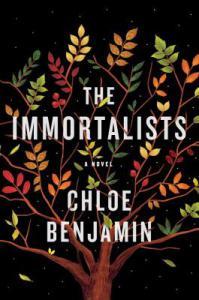
Book Cover Image: The Immortalists by Chloe Benjamin
" data-orig-size="265,400" sizes="(max-width: 199px) 100vw, 199px" aperture="aperture" />BOTTOM LINE: Good but I read a similar story I liked a lot better
Genre: Literary Fiction
Publication Date: 9 January 2018
Source: Publisher via NetGalley
Synopsis from the Publisher:
“If you knew the date of your death, how would you live your life?
It’s 1969 in New York City’s Lower East Side, and word has spread of the arrival of a mystical woman, a traveling psychic who claims to be able to tell anyone the day they will die. The Gold children—four adolescents on the cusp of self-awareness—sneak out to hear their fortunes.
The prophecies inform their next five decades. Golden-boy Simon escapes to the West Coast, searching for love in ’80s San Francisco; dreamy Klara becomes a Las Vegas magician, obsessed with blurring reality and fantasy; eldest son Daniel seeks security as an army doctor post-9/11; and bookish Varya throws herself into longevity research, where she tests the boundary between science and immortality.
A sweeping novel of remarkable ambition and depth, The Immortalists probes the line between destiny and choice, reality and illusion, this world and the next. It is a deeply moving testament to the power of story, the nature of belief, and the unrelenting pull of familial bonds.”
My Thoughts: In many ways, The Immortalists is an adult version of They Both Die at the End. Both explore the idea of fate versus choice. Both deal with the idea of living your life knowing when your last day is. Unfortunately, as good as Chloe Benjamin‘s novel is, I do think Adam Silvera did it better.
The thing is, The Immortalists is a well-written novel. The Gold children each deal with the knowledge of their death date in different ways, with a wide variety of success and tragedy. Simon’s story is particularly poignant and inspiring. No matter how you react to each of the siblings, however, Ms. Benjamin gets you to react. You care enough to feel for these four children and the lives they lead. Their deaths, while not unexpected, are still tragic in the fact that they happen if not how. You want the psychic to be wrong and hope the kids can beat back any demons that haunt them. It is an emotional novel that questions the idea of fate versus choice.
In spite of all that emotional goodness, I am left feeling rather unsatisfied. One could debate for days whether each of the siblings would have acted in the same way had they never learned about their death date and therefore knowing this information contributed to their demise. It makes for a fascinating but ultimately unsatisfactory discussion because there are no definitive answers to either point. Regardless if there was, this is not the point of the story. The story is about family and about living a genuine life. The thing is that no one really learns these lessons. The siblings part ways early on in the novel and remain apart from one another if not completely estranged in some form. As for living a genuine life, well, that too may be up for debate. This all makes me question whether the learning lessons are more for readers rather than the characters, which I find somewhat disappointing. The Immortalists then becomes a 352-page lecture, albeit a well-told one.
I suspect my feelings about The Immortalists would be different had I not read Adam Silver’s latest masterpiece a few short months ago. In his story, the focus is two characters and one day, allowing readers a greater opportunity to get to know them and to experience their last day alongside them. Ms. Benjamin has us as silent witnesses versus silent participants. Not only that but by keeping the focus to one day, we see the difference it makes when one truly lives their life without fear and without worry. Ms. Benjamin’s version, by occurring over five decades, makes this more nebulous, and we don’t necessarily see the Gold siblings living without fear or worry. We see them, for the most part, as adults worried about the same things as every other adult.
For me, The Immortalists is good but it cannot be as good as Adam Silvera’s novel. This is not only because I read it first but also because I remain more impressed with how he told his story, with his characterization, and the method by which he laid out his theme. Ms. Benjamin’s novel suffers from uneven characters, a theme which makes no sense in the context of the story, and from the feeling of repetitiveness that comes with having recently read a more impressive and memorable similar story.












Related Stories
- Green leaves you blue
- The Wolves of Winter left me cold
- The Lost Plot makes me love Irene and Kai even more



